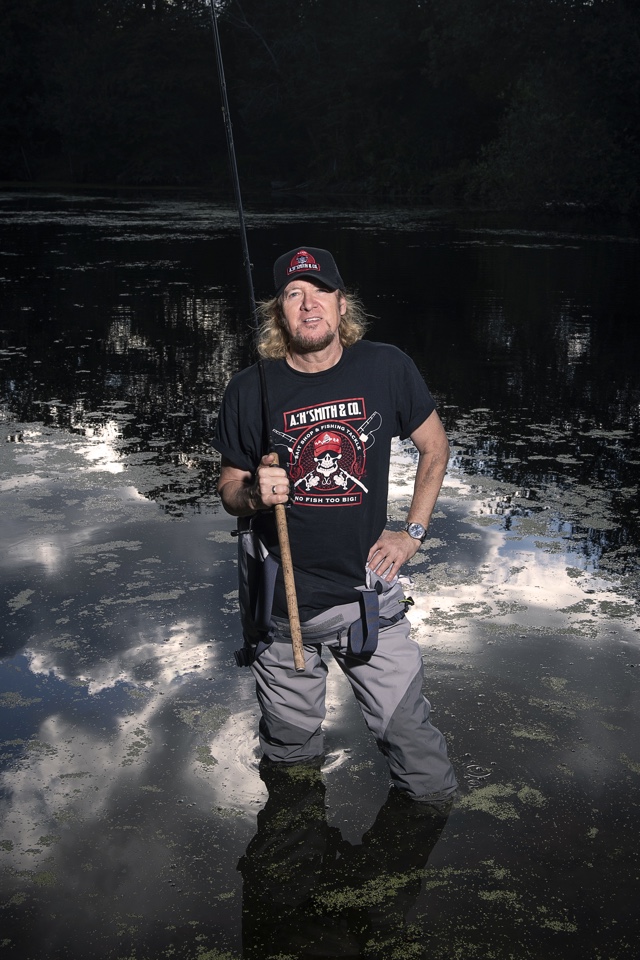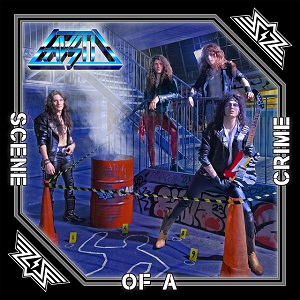IRON MAIDEN’s Adrian Smith Talks Fishing, Going Solo With BRUCE DICKINSON, Killers Era - “I Haven’t Seen PAUL DI’ANNO For Years And Years”
November 26, 2020, 4 years ago
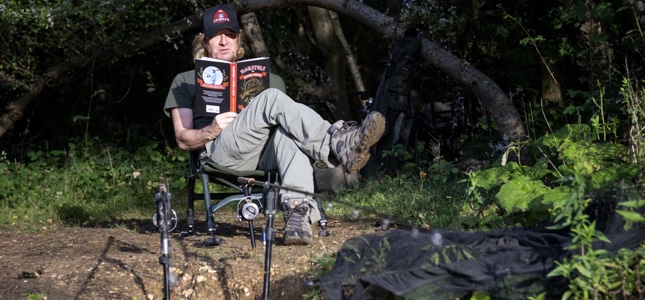
Well, this came out of the blue - the blue water that is. They always say never judge a book by its cover and who woulda thunk that Iron Maiden legend Adrian Smith - the guitarist who penned "2 Minutes To Midnight”, “Flight Of Icarus”, “Wasted Years”, "Can I Play With Madness" and “The Prisoner” to name a few - has carried a fishing rod with him on every tour around the globe. An anglers wet dream, pun intended.
Monsters Of River And Rock, out now via Virgin Books is a 290-page memoir focusing on his love of fishing, something that began as a youth growing up in East London and continues to this day. Due to it’s vast and varied geography of lakes, rivers, tributaries and streams, there happens to be a Canuck connection.
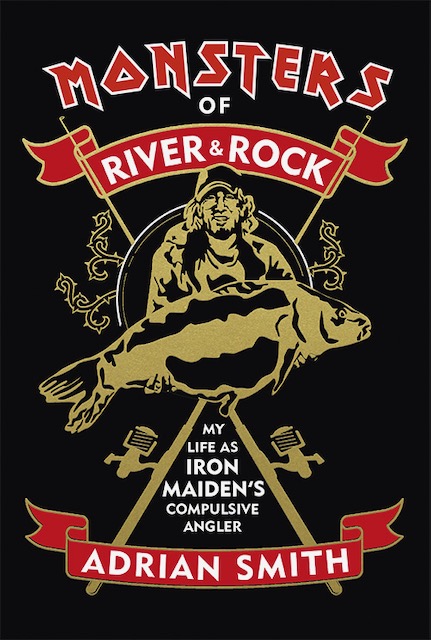
“It’s pretty popular in Canada,” Smith begins about the sport which sees all shapes and sizes take part in throughout the year, rain, sunshine or snow.
“It’s a massive country, it’s not overcrowded, and there’s a lot of water up there. I’ve spent a lot of time around the Montreal area; my wife’s from there, so I’ve fished the St. Lawrence, and out west to Kamloops and all around British Columbia. It’s a fantastic place for fishing.”
BraveWords: Well, you really have the dream job, with being on the road so much, obviously Iron Maiden is travelling to almost every country on the planet. Do you have the opportunities to actually go out and take advantage of the locations where you are playing and performing?
Smith: “Absolutely. I mean even from the very early days from the early 1980’s we used to take fishing rods on the tour bus with the band, me and Clive Burr the late drummer, and Dave Murray, and on days off we’d take a rod and hire a car and go fishing somewhere. We’ve always done that, up to the present day, but now it’s more sophisticated. I take a lot of gear on the truck - I’ve got my fly rods, I’ve got my bass kit, and it all goes on the truck with the guitars and the amps, and my guitar tech gets it off when I need it. I’ve been lucky enough, you can always find somewhere to fish on your day off, somewhere to work a line in. It’s a kind of meditation, it gets your mind off everything. I don’t think of anything else when I’m fishing.”
BraveWords: You have a guitar tech, do you have a fishing tech?
Smith: “No, but sometimes I think it would be nice to have somebody to carry all your equipment. That would be really decadent, wouldn’t it?”
BraveWords: Absolutely. Well, it’s funny because we all have our hobbies but when it was announced that you were releasing a fishing book, a large part of the Iron Maiden fan base stood back and said, ‘Really?’. It’s kind of a hidden hobby of yours.
Smith: “I thought it was a bit more well known, but obviously people were surprised. People have got to bear in mind that it is a fishing book, that’s the way it started anyway. I do a timeline through the book, growing up where I grew up, fishing in the cities and the dirty canals of London with my dad, then getting into music and giving up the fishing and playing soccer and things like that in order to concentrate on learning my craft as a musician, right through to joining Iron Maiden, and through to the present day. It’s all in there.”

BraveWords: You really are living the dream because you’re a professional musician, which is not like work, and you get to fish, which also doesn’t feel like work.
Smith: “Yeah, it’s a pretty charmed life really. Although like you say it’s not really like work playing guitar in a band, it’s all the stuff that goes along with it, the travelling, living in hotels and all of that - it sounds glamorous but it’s not. Like I describe in the book, having a police escort to a show might sound thrilling, but really when you’ve been doing it for a few years it’s really a drag. Flying around in a van with some crazy South American police escort, acting out his car chase fantasies with you on board. I am lucky though, there’s no doubt about it.”
BraveWords: The parallels between fishing and learning the guitar - they’ve both taken a lot of patience and a hell of a lot of discipline.
Smith: “Yeah, the guitar - people always asked what I’m going to do with my life. I walked into my older sister’s room when I was 15 and I discovered she had this album by a band called Deep Purple, and I put it on and I had never heard heavy metal before or heavy rock, and it just sort of changed my life. I thought, ‘I’d love you do this’. I was always infatuated with the Beatles, I loved them when I was little kid, so it was always in my blood. My family was musical. So that’s what I wanted to do and I figured that if you want to do something that badly, you stick with it. I was fortunate to meet Dave Murray when I was a kid. He had already been playing the guitar for a couple years and he was actually really good. I describe in the book the first time we ever met up and made music together when I was singing and Dave was playing. It takes dedication to learn. I wish I’d had a bit more teaching when I was younger, to show me some short cuts. Fishing, my dad taught me the basics and you just sort of learn as you go along. Nowadays there’s so much information - for playing the guitar and how to fish. If you want to catch a 10 lb. trout, you can find out on the internet where you’ve got your best chances of catching one. Before the internet there was a lot more detective work involved. In that respect, maybe it’s not so much of a challenge anymore. It’s the same with guitar playing and music. Quality instruments are much cheaper and widespread, all the gear you need is much more accessible, and information on how to play anything. Even if you want to do it digitally and download your favourite Van Halen sound or your Dream Theater sound, you can download it and then you have that sound. It’s incredible really. I don’t know if that’s a good thing or a bad thing.”
BraveWords: If you ask any angler, they always tell you the big story of the one that got away. So what is Adrian Smith’s story about the one that got away?
Smith: “There’s a couple in the book. You remember the ones that got away almost as much as the ones that didn’t. When I was a kid, maybe 11 or 12, I was trying to catch my first ever big fish, it was a carp, and I actually managed to hook one and I had it on for a while and as I was playing it I was imagining the praises I would get from my dad and all the men of the fishing club. I would come of age as a fisherman and earn the respect of the men in the group, but of course I lost it. I was disappointed and I can still remember the feeling. I can remember the broken line fluttering in the wind. That makes an impression.”
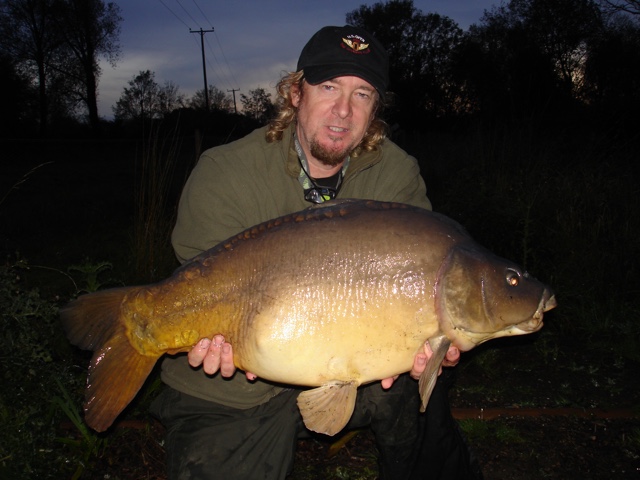
BraveWords: What are some of your bucket list locations that you actually haven’t travelled to, where you’d like to put your line in the water?
Smith: “Well, there’s not many left now. I’ve been very lucky to fish all through Canada, but there’s still a few places out there in Newfoundland. I’ve been all throughout the Caribbean. I’ve even been up in the Andes, in Ecuador, that was on a day off while we were on tour. We were so high up, and it was cold, but the sun was strong and I didn’t put any sunblock on and I had a sunburn on my face for a good year after that. The conditions were really wild up here, it was really windy. I actually had to have some minor surgery after that to deal with some stuff on my face. I’ve been everywhere, there’s not many places that I’ve got a hankering to fish in, I stay close to home these days. I get enjoyment going down to my local river and just fishing for a couple of hours.”
BraveWords: Have you ever fished Loch Ness?
Smith: “No, but it’s supposed to be quite good. I can’t say I’ve every wanted to fish there, although Scotland is quite beautiful.”
BraveWords: Now, Iron Maiden has their hands in everything when it comes to swag - when are we going to see a Rapala Iron Maiden lure or a fishing rod with your name on it? I’m sure your manager, “Rod” Smallwood, could be convinced! (both start laughing).
Smith: “Well, I’ve been fishing a long time and I’ve got a few ideas that might translate to the fishing market place. I’d have to be approached by someone. They do have signature fishing rods, and it would be real nice to do something like that, a fishing rod under my own name or something like that. That would be incredible, but so far no one’s come forward. I’m open to it for sure.”
BraveWords: Since we’re doing the parallels between guitar and fishing, may I ask you a couple of guitar questions? Are musicians even at your level still learning to play the guitar?
Smith: “Absolutely. I go through periods where I try to learn something new, like before we do a recording with Iron Maiden I try to perfect a few new licks so that we’re not playing the same old stuff. Maybe get some new pedals to try out, and maybe they’ll inspire a new riff or a new song, of a new piece of music. I enjoy learning new things. That’s what keeps you going really.”
BraveWords: Did Eddie Van Halen have an influence on you?
Smith: “Not really. Probably a bit but when I heard Van Halen in the late ’70’s I think I’d already been playing five years. My style was already kind of established. I grew up listening to the British guys like Paul Kossoff and Eric Clapton, and Michael Schenker, Pat Travers, Johnny Winter - and then Van Halen came around. Probably if I’d just started playing when Van Halen came about my style would be different. Also, I was the singer in a band so I was a singing guitarist and the second guitarist, so I didn’t have to carry all the weight, so maybe I didn’t learn guitar as fast I should, I always had a virtuoso to rely on. Like Andy Barnett who was in the band Urchin for many years, he was an amazing guitarist. He ended up playing with a band called FM. Although I love Van Halen and I love what he does, I wouldn’t say I was particularly influenced by him.”
BraveWords: When you listen to your own creations, what is the guitarist you hear that is an influence on songs that you’ve written?
Smith: “I think if you go back you can hear a bit of Pat Travers and Johnny Winter in there but it would probably be hard to detect on an Iron Maiden song. Like when I wrote ‘2 Minutes To Midnight’, stuff like that. Michael Schenker is probably my biggest influence. I like to use wah wah pedals to get tone, especially live so it comes through. I thought he was amazing, I used to go see him at a place called The Roundhouse in London, he was with UFO and he might have been 17 or 18 - only a year older than myself - but he was already a prodigy. He was massively inspiring. When I saw him I went out and dyed my hair blonde and starting wearing the same clothes as him. The only thing I didn’t get was a Flying V because I couldn’t afford it.”
BraveWords: Have you met some of these legends who influenced you?
Smith: “Yeah, I have. I met Gary Moore when we were doing the Killers album, at a place called Battery Studios in London. They had a bar there and Gary was doing an album. It was in his metal phase, he wasn’t doing his Blues yet. We met him in the bar, it was me and Dave and a few others, and he invited us into the studio where they were recording. He was playing with Don Airey, Ian Paice, and I think it was Neil Murray on bass. They were playing live and it sounded incredible, it sounded controlled. He was playing that big Strat, and I’ll never forget that. It was just an incredible experience and he was so nice to us. I met Scott Gorham once, he’s a hero of mine, and I literally bumped into Brian Robertson one night in a club and we nearly had a fight. Scott Gorham is a great friend of mine and a really good guy, but Brian Robertson seemed like a typical Glaswegian hard man, but we shook hands and everything was cool. So yeah, I’ve met my heroes.”
BraveWords: Let’s dive deep into some of your musical history. You released your short-lived A.S.a.P. album Silver And Gold in 1989, which led to you leaving Iron Maiden. Then you emerged with Psycho Motel and two hard-to-find releases, State Of Mind (1995) and Welcome To The World (1997), the latter a very solid effort. Do you ever go back and revisit this material?
Smith: “I think the Psycho Motel stuff was re-released a few years ago, but no, the other guys are doing different things now. I like to do new things all the time. It’s like going to new places to fish, it’s always exciting, sort of a journey of discovery, and I think it’s the same with music. I get bored with doing the same thing all the time, so I like to do things outside. Unfortunately, we never had the chance to tour with ASaP or Psycho Motel. I would have liked to have done that at the time, but it may be a bit late in the day now, I don’t know.”
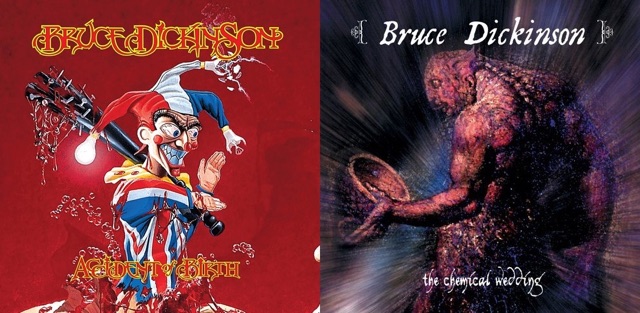
BraveWords: You left Iron Maiden prior to the release of No Prayer For The Dying, which coincidentally features one song you wrote with Bruce called “Hooks In You”. During the Blaze Bayley years, you hooked back up with Bruce Dickinson for his 1997 album, Accident Of Birth, soon becoming a full-time member alongside guitarist/producer Roy Z. Along with bassist Eddie Casillas and drummer David Ingraham, the Bruce Dickinson band would tour the world twice in support of Accident Of Birth and the follow-up the year after, The Chemical Wedding. Maiden fans were certainly pleased with the reunion.
Smith: “Yeah, that was a good time. Bruce rang me up out of the blue and asked me if I want to join his satellite band. He said, ‘Well, I’ll come round and play you what I’m doing with Roy Z.’ And he did, he came round and he played demos of what would become Accident Of Birth. I loved it straightaway, it was very powerful, very guitar oriented. I said, ‘Yeah, I’m in. I’ve got a few songs.” I had a lot of fun for three-four years, two tours with Bruce, two studio albums and a live album.”
BraveWords: Did you guys worry what Steve Harris was thinking at the same time?
Smith: “Not really. We did a couple of Iron Maiden songs live but then again we wrote them. We did ‘2 Minutes To Midnight’, ‘Run To The Hills’, ‘Flight Of Icarus’ - songs that Bruce and I wrote. I didn’t see any problem with doing that. We were doing stadiums down in South America and people loved it. It was a great band as well. There’s some stuff from South America on one of those tours that’s on YouTube now, and I still think it stands up and sounds good.”
BraveWords: Roy Z is one of my favourite musicians on the planet.
Smith: “He’s a great musician, yeah. He’s taught guitar and he picked up a few things in my playing and commented on them when we started playing together, and he gave me ideas about improving certain aspects of my playing. I think I really improved when I played with him because he’s so good.”
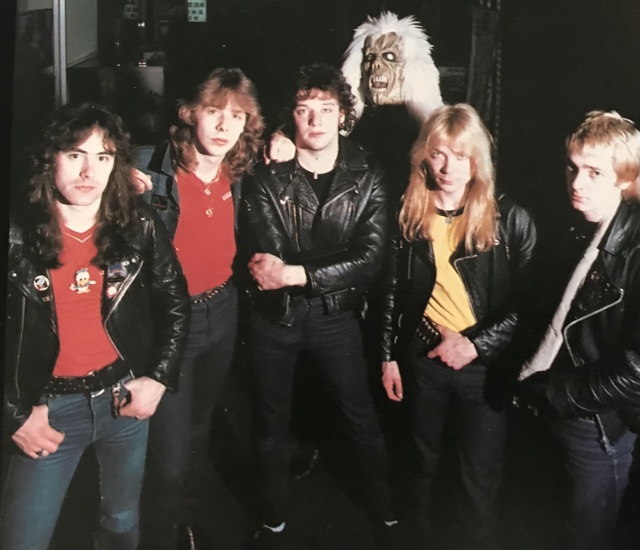
BraveWords: Do you have any contact with Paul Di’Anno?
Smith: “I haven’t seen Paul for years and years. I met him at a studio when I was doing my solo project, but I haven’t been in touch with him at all.”
BraveWords: Do you revisit Killers, or that era of Iron Maiden?
Smith: “Yeah, there’s some old stuff on YouTube. It was a very different band then. I actually like it, we weren’t doing any epic songs then, we were doing stuff like ‘Innocent Exile’, we still played ‘Wrathchild’ then. It was a different band, a different vibe with Paul in it. I have fond memories, definitely.”
BraveWords: The entire Iron Maiden fan base has some fond memories as well. Thank you so much! Good luck with what you guys are working on, and hopefully this COVID goes away so we can actually see you guys on the road, maybe next year.
Smith: “Absolutely yeah, fingers crossed.”
